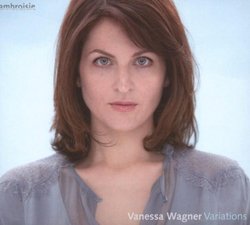| All Artists: Franz Joseph Haydn, Sergey Rachmaninov, Luciano Berio, Jean-Philippe Rameau, Johannes Brahms, Vanessa Wagner Title: Variations Members Wishing: 2 Total Copies: 0 Label: Naive Original Release Date: 1/1/2008 Re-Release Date: 10/28/2008 Genres: Special Interest, Classical Styles: Chamber Music, Historical Periods, Baroque (c.1600-1750), Classical (c.1770-1830), Modern, 20th, & 21st Century Number of Discs: 1 SwapaCD Credits: 1 UPC: 822186001349 |
Search - Franz Joseph Haydn, Sergey Rachmaninov, Luciano Berio :: Variations
 | Franz Joseph Haydn, Sergey Rachmaninov, Luciano Berio Variations Genres: Special Interest, Classical |
Larger Image |
CD Details |
CD ReviewsA Pianist to Watch J Scott Morrison | Middlebury VT, USA | 11/15/2008 (5 out of 5 stars) "Vanessa Wagner is a thirty-something French pianist, a beautiful woman and, more important, a beautiful pianist. I'd never heard of her before but her program consisting of piano variations by composers spanning three hundred years intrigued me. I have to say that I was immediately entranced by her playing. The first piece on the CD, Haydn's not-often-enough-played F Minor Variations (Hob.XVIII:6), is my favorite Haydn piano work, possibly his finest work for the instrument. This performance is, in a word, stunning. The Variations are, in the main, quiet, inward, serene. The first thing I noticed, aside from the beautiful sound of her magnificent Steinway D piano, is the unfailing beauty and variety of her touch. There is never an ugly sound on this entire disc. But more than that, there is variation in tone that always suits the music at hand. Wagner is a soulful pianist. It is clear that every note has been careful considered and that the feeling expressed by the music is the main consideration. We don't think of Haydn being a Romantic, of course, but some of his music, including this set of variations, is personal and heartfelt. Like Mozart's Fantasia for Piano Four-Hands (also in F Minor), the music while observing the constraints of the Classical style nonetheless conveys deep feeling.
The Haydn is followed by Rachmaninov's Variations on a Theme of Corelli, Op. 42. My favorite version of this set of variations, up to now, has been that of Ashkenazy -- and I also like Olga Kern's -- but the combination of marvelously present recorded sound and the pianist's awareness that in this work, Rachmaninov's only major piano work written outside Russia and the last solo piano work he ever wrote, is more classical, less 'Rachmaninovian' than any of his solo works. It requires clear understanding of its structure (and probably for this reason Wagner does not omit Variations 11, 12 and 19, designated as optional by the composer); Wagner groups the succeeding variations as parts of a larger structure that comprise a three-movement form (Allegro & Scherzo, Adagio, Finale). Luciano Berio's Cinque Variazioni are new to me. Wagner plays the 1966 revision of this 1952/3 work. It is based on a three-note motif (sung to the word 'fratello' ['brother']) from Dallapiccola's opera 'Il prigioniero' and is dedicated to that composer. It is a twelve-tone work consisting of five variations and a coda that returns to the opening ninths-dominated harmonies. There is extensive use of sound-blurring pedal and extremely soft sonorities. Wagner's management of tone color and variations in touch is jaw-droppingly skilled. Rameau's 'Gavotte variée' is seven-and-a-half minutes of early Baroque Gallic clarity requiring close attention to attack, repeated notes, counterpoint and pedaling -- and yes, Wagner does use the pedal here -- which Wagner handles with such delicacy and crystalline tone that I am eager to hear her play more music from the Baroque. I suspect her Bach would be worth hearing. The final work is Brahms's Variations on a Theme of Schumann, Op. 9, the theme being from one of Schumann's 'Bunte Blätter'. Written for Clara Schumann during the time that her husband Robert was languishing in a mental institution, the theme itself is a minor-key chorale in F sharp minor that is then varied to represent, so it is said, Brahms himself, Robert, Clara, Schumann's alter egos Florestan and Eusebius, and some say there is also a section that represents Brahms's love for Clara. Wagner plays the work in a muted, introspective manner that nonetheless contains much pathos. I will admit that sometimes my attention flags in this early Brahms work, but not during this performance. I think this is because of Wagner's expressive manner with this high Romantic (and romantic) work. Lest you miss my point, I find Mlle Wagner's playing exceedingly engaging and I look forward to hearing anything she chooses to record. If she plays a recital anywhere near me I will be there. Highly recommended. Scott Morrison " |
